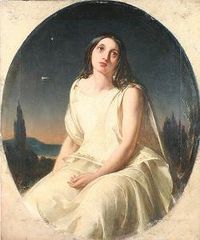Annotation:Maid of Judah (The): Difference between revisions
No edit summary |
m (Text replacement - "garamond, serif" to "sans-serif") |
||
| (6 intermediate revisions by one other user not shown) | |||
| Line 1: | Line 1: | ||
'''Back to [[{{BASEPAGENAME}}]]''' | =='''Back to [[{{BASEPAGENAME}}]]'''== | ||
---- | ---- | ||
<p><font face=" | <p><font face="sans-serif" size="4"> | ||
'''MAID OF JUDAH, THE.''' English, Air (4/4 time). England, Shropshire. G Major. Standard tuning (fiddle). AABB. '''The Maid of Judah''' | '''MAID OF JUDAH, THE.''' English (originally Italian), Air (4/4 time). England, Shropshire. G Major. Standard tuning (fiddle). AABB. '''The Maid of Judah, or Knights Templars''' was the name of an opera arranged and adapted to the English stage by Michael Rophino Lacy (1795-1867), from the original pasticcio '''Ivanhoe''', by the Italian composer Rossini. ''Pasticcio'' indicates that the music was selected from four of Rossini's former operas, '''Semiramide,''' '''Mosè,''' '''Tancredi,''' and '''La gazza ladra''', arranged by Antonio Pacini. Lacy's adaptation was staged at the Theater Royal, Covent Garden, in 1829, while Rossini's opera premiered in Paris in 1826. The 'Maid of Judah' refers to the character Rebecca, daughter of Isaac of York, in Sir Walter Scott's widely popular book '''Ivanhoe''', and Scott himself was in the audience in Paris in October, 1826, to view Rossini's staging. He wrote in his journal: | ||
[[File:judah.jpg|200px|thumb|left|Rebecca, the Maid of Judah. By Charles Rolt]] | |||
<blockquote> | |||
''It was superbly got up, the Norman soldiers wearing pointed helmets and what resembled much hauberks of mail, which'' | |||
''looked very well. The number of the attendants, and the skill with which they were moved and grouped on the stage,'' | |||
''were well worthy of notice. It was an opera, and of course the story greatly mangled, and the dialogue in a great'' | |||
''part nonsense. Yet it was strange to hear anything like the words which I (then in an agony of pain with spasms in my'' ''stomach) dictated to William Laidlaw at Abbotsford, now recited in a foreign tongue, and for the amusement of a'' | |||
''strange people.'' | |||
</blockquote> | |||
"Maid of Judah" became a popular name in mid-19th century and was attached, for example, to a clipper ship, part of the Aberdeen Star Line, and an Australian gold mine. | |||
</font></p> | </font></p> | ||
<p><font face=" | <p><font face="sans-serif" size="4"> | ||
''Source for notated version'': a c. 1837-1840 MS by Shropshire musician John Moore [Ashman]. | ''Source for notated version'': a c. 1837-1840 MS by Shropshire musician John Moore [Ashman]. | ||
<br> | <br> | ||
<br> | <br> | ||
</font></p> | </font></p> | ||
<p><font face=" | <p><font face="sans-serif" size="4"> | ||
''Printed sources'': Ashman ('''The Ironbridge Hornpipe'''), 1991; No. 48, p. 18. | ''Printed sources'': Ashman ('''The Ironbridge Hornpipe'''), 1991; No. 48, p. 18. | ||
<br> | <br> | ||
<br> | <br> | ||
</font></p> | </font></p> | ||
<p><font face=" | <p><font face="sans-serif" size="4"> | ||
''Recorded sources'': <font color=teal></font> | ''Recorded sources'': <font color=teal></font> | ||
</font></p> | </font></p> | ||
| Line 20: | Line 29: | ||
<br> | <br> | ||
---- | ---- | ||
'''Back to [[{{BASEPAGENAME}}]]''' | =='''Back to [[{{BASEPAGENAME}}]]'''== | ||
Latest revision as of 14:18, 6 May 2019
Back to Maid of Judah (The)
MAID OF JUDAH, THE. English (originally Italian), Air (4/4 time). England, Shropshire. G Major. Standard tuning (fiddle). AABB. The Maid of Judah, or Knights Templars was the name of an opera arranged and adapted to the English stage by Michael Rophino Lacy (1795-1867), from the original pasticcio Ivanhoe, by the Italian composer Rossini. Pasticcio indicates that the music was selected from four of Rossini's former operas, Semiramide, Mosè, Tancredi, and La gazza ladra, arranged by Antonio Pacini. Lacy's adaptation was staged at the Theater Royal, Covent Garden, in 1829, while Rossini's opera premiered in Paris in 1826. The 'Maid of Judah' refers to the character Rebecca, daughter of Isaac of York, in Sir Walter Scott's widely popular book Ivanhoe, and Scott himself was in the audience in Paris in October, 1826, to view Rossini's staging. He wrote in his journal:

It was superbly got up, the Norman soldiers wearing pointed helmets and what resembled much hauberks of mail, which looked very well. The number of the attendants, and the skill with which they were moved and grouped on the stage, were well worthy of notice. It was an opera, and of course the story greatly mangled, and the dialogue in a great part nonsense. Yet it was strange to hear anything like the words which I (then in an agony of pain with spasms in my stomach) dictated to William Laidlaw at Abbotsford, now recited in a foreign tongue, and for the amusement of a strange people.
"Maid of Judah" became a popular name in mid-19th century and was attached, for example, to a clipper ship, part of the Aberdeen Star Line, and an Australian gold mine.
Source for notated version: a c. 1837-1840 MS by Shropshire musician John Moore [Ashman].
Printed sources: Ashman (The Ironbridge Hornpipe), 1991; No. 48, p. 18.
Recorded sources:
